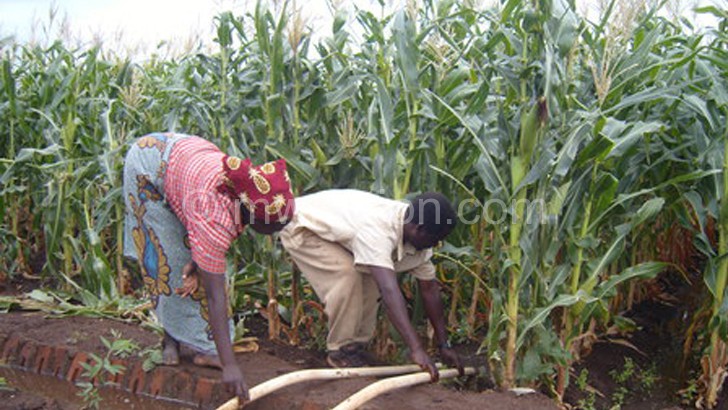Fruits of irrigation farming, manure
Irrigation farming is touted as one of the best practices of farming the world over. This is because rainfall has become unpredictable due to effects of climate change.
Countries which depend highly on irrigation farming, such as Pakistan, which has 72 percent of the population taking agriculture as their source of income, are likely to become more food secure as they have the ability to produce different crops throughout the year.
Pakistan has the largest canal-based irrigation system in the world which enables its people to extensively practise irrigation farming.
Apart from that, the country has enabling equipment and is technologically advanced, which is a big plus.
Similarly, in Malawi, there are several areas that are located close to rivers, dams and lakes, which, if well capitalised, farmers living within them can maximise their crop production through practising irrigation farming and other methods.
One such area capitalising on its nearness to water bodies is Nyamphota in Chikwawa. Farmers in the area boast about the fruits of practising irrigation farming using treadle pumps and application of manure.
Though the area receives erratic rainfall to enable farmers harvest adequate farm produce, the farmers are producing enough for their families.
Peter Kandiero from Mafale Village, Paramount Chief Lundu, who is one of the farmers practicing irrigation farming at Nyamphota Irrigation Scheme, says irrigation farming and use of manure in crop production is proving to be beneficial as they are able to plant a wide range of crops.
Kandiero, who says the scheme now highly depends on irrigation, is optimistic that the farmers will have a bumper harvest this year.
He says in the previous farming season, they depended on rainfall and the yield was poor as apart from being affected by inadequate rains, the crops were also attacked by fall armyworms.
“In the previous farming season, we were hardly hit by the fall armyworm outbreak as we did not know how to control it apart from a poor rainfall pattern,” he says, adding: “As a result, this time around we have tried our best to incorporate all methods in controlling it as we are highly dependent on irrigation farming and using manure. Our efforts are showing off.”
A walk around the scheme in the usual scorching sun that characterises the district bears testimony that efforts by the farmers are indeed paying off.
The scheme has green maize which will be ready for harvest in the next one or two months, healthy looking vegetables and sweet potatoes, among other crops.
Margaret Nsana, another farmer from the scheme, also shares the same sentiments with Kandiero. She says farmers are benefiting from irrigation farming and use of manure.
“Ever since we started using manure, we have only applied fertiliser once but the outcome is great. We have managed to harvest some crops in a space of less than three months and we are still waiting for others.
“However, the only setback that we have had to face is the impact of the fall armyworm that we are still trying to control with all means up to now,” she says.
Programme manager for Shire Valley Agriculture Development Division (SVADD) Ida Mwato says her office is making efforts to help the farmers deal with the fall armyworms.
“The fall armyworms outbreak has indeed affected livelihood of the farmers but we are managing it, it is not over yet. We are grateful that there are so many individuals and organisations as well as donors who are also taking part in the fight against this fall armyworms outbreak, a development which is a motivation to the farmers,” she says
Paramount Chief Lundu stresses that there is need for the farmers to put in much effort in fighting the fall armyworms so that their output is not affected in any way.
Lundu says irrigation farming is making people in the area to become self-reliant as they are managing to plant a wide variety of crops that is helping them not depend on organisations for food relief.
“As you can notice, these farmers are likely going to harvest more as they are putting effort in irrigation techniques they are employing,” says Lundu. “However, they need to put in extra effort so that at the end of the day they get the desired output.”
Nyamphota Irrigation Scheme has 376 farmers and they highly depend on irrigation farming by use of treadle pumps and use of manure for their crop production.





